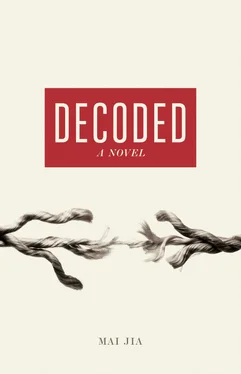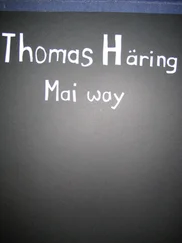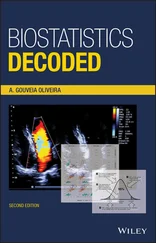Mai Jia - Decoded
Здесь есть возможность читать онлайн «Mai Jia - Decoded» весь текст электронной книги совершенно бесплатно (целиком полную версию без сокращений). В некоторых случаях можно слушать аудио, скачать через торрент в формате fb2 и присутствует краткое содержание. Год выпуска: 2014, Издательство: Allen Lane, Жанр: Современная проза, на английском языке. Описание произведения, (предисловие) а так же отзывы посетителей доступны на портале библиотеки ЛибКат.
- Название:Decoded
- Автор:
- Издательство:Allen Lane
- Жанр:
- Год:2014
- ISBN:нет данных
- Рейтинг книги:3 / 5. Голосов: 1
-
Избранное:Добавить в избранное
- Отзывы:
-
Ваша оценка:
- 60
- 1
- 2
- 3
- 4
- 5
Decoded: краткое содержание, описание и аннотация
Предлагаем к чтению аннотацию, описание, краткое содержание или предисловие (зависит от того, что написал сам автор книги «Decoded»). Если вы не нашли необходимую информацию о книге — напишите в комментариях, мы постараемся отыскать её.
Decoded — читать онлайн бесплатно полную книгу (весь текст) целиком
Ниже представлен текст книги, разбитый по страницам. Система сохранения места последней прочитанной страницы, позволяет с удобством читать онлайн бесплатно книгу «Decoded», без необходимости каждый раз заново искать на чём Вы остановились. Поставьте закладку, и сможете в любой момент перейти на страницу, на которой закончили чтение.
Интервал:
Закладка:
1. The main dish was going to be a bowl of noodles, just like the kind that people eat on their birthdays to symbolize many happy returns of the day.
2. The noodles had to be made of buckwheat. Buckwheat noodles are softer than the ordinary kind. This would symbolize that people have to be more forgiving and flexible when they are among strangers.
3. The flavourings for this noodle soup should include vinegar, chilli peppers and walnuts. Walnuts are bitter. This would symbolize that of the four flavours, bitterness, sourness and spiciness would be left behind at home; once he left everything would be sweet.
4. Not too much soup was to be made, because when the time came, Jinzhen was supposed to drink every last drop, to symbolize completeness and success.
It was just a bowl of soup, but it represented all the old lady’s fondest hopes and wishes for him. When this meaningful bowl of soup was brought bubbling into the dining room, Mrs Lillie called Jinzhen to table. She took a jade pendant, in the shape of a crouching tiger, out of her pocket and put it in Jinzhen’s hands, telling him to eat up and then tie this to his belt, where it would bring him good luck. Just then, they heard the sound of a car pulling up outside. Shortly afterwards, Zheng the Gimp came in with his chauffeur. He said hello to everyone and told the chauffeur to put the boxes in the car.
Jinzhen sat there quietly eating his noodles. Once he started eating, he did not say anything, but it was the kind of silence that you get when someone has a great deal that they want to say but no idea where to start. Even when he had finished his noodles, he sat there without a word. He clearly had no intention of getting up.
Zheng the Gimp came in and clapped him on the back, as if he were in complete charge of the situation. He said, ‘It is time to say goodbye. I will be waiting for you in the car.’ He said goodbye to Young Lillie, his wife, and Master Rong, and then left.
The room fell silent. The people present looked quietly at one another; their gaze became concentrated, fixed. Jinzhen was still holding onto his jade. He was stroking it with one hand. That was the only movement in the room.Mrs Lillie said: ‘Tie it onto your belt. It will bring you good luck.’
Jinzhen put the jade up to his lips and kissed it, after which he started to tie it onto his belt.
It was just at that moment that Young Lillie took the jade out of his hands and said: ‘Only a fool would expect something to bring him good luck. You are a genius and you are going to make your own luck.’ He took out the Waterman pen that he had used for nearly half a century and put it in Jinzhen’s hands, saying: ‘You will find this much more useful. You can use it to make a note of your ideas. If you don’t let them run away from you, you will find that no one can even come close to you.’
Jinzhen did exactly the same thing. He kissed the pen in silence and then put it in his breast-pocket. At that moment, they heard the brief blast of a car horn coming from outside — very short. Jinzhen didn’t seem to have noticed it; he sat there without moving.
Young Lillie said, ‘They are trying to hurry you up. Off you go.’
Jinzhen sat there, without moving.
Young Lillie said, ‘You are going to be working for the nation — you should be happy.’
Jinzhen continued to sit there without moving.
Young Lillie said, ‘This house is your home. When you leave this house, you are in your country. If you have no country you can have no home. Go on. They are waiting for you.’
Jinzhen sat there, unmoving. It was as if the sorrow of parting had nailed him to his chair. He couldn’t move!
There was another blast from the horn of the waiting car. This time it was much longer. Young Lillie realized that Jinzhen was still showing no signs of going, so he glanced at his wife, wanting her to say something.
Mrs Lillie stepped forward, resting her two hands lightly on Jinzhen’s shoulders. She said, ‘Off you go, Zhendi. You have to go. I will be waiting for your letters.’
It seemed as though the touch of the old lady’s hands had woken Jinzhen from his sleep. With a curious stumbling motion, he rose to his feet, moving as if in a trance. When he got to the door, Jinzhen suddenly turned round and fell to his knees with a thud. He kowtowed to the old couple with resounding knocks of the head. In a voice choked with tears, he said, ‘Mum, I am leaving now. But even if I go to the ends of the earth, I am still your son. . ’
It was five o’clock in the morning, on 11 June 1956. Jinzhen, the star of the mathematics department for the last ten years, a man who had quietly become a fixture at N University, upped and left on a mysterious journey from which he never returned. Before he left, he requested permission from the old couple to change his name — in future he wanted to be called Rong Jinzhen. He said goodbye to his family and embarked upon a new life with a new name — an already tear-soaked parting was now rendered even more upsetting, as if both sides were aware that this was no ordinary separation. The fact is that when he left, no one knew where Rong Jinzhen went. He got into the jeep just as dawn was breaking and it took him away — he disappeared into another world. He simply vanished. It was as if his new name and his new identity fell like an axe, separating his past from his future, marking his departure from the mundane world. All that anyone knew was that he had gone somewhere else — the only contact address that they had was right there in the provincial capital: Box No. 36.
It seemed that he was really close by, right beside them.
But in fact no one knew where he had gone. . [Transcript of the interview with Master Rong]
I asked a couple of my former students who had ended up working for the post office, what work unit had Box No. 36 and where was it? They all said that they did not know — it seemed to be an address for somewhere beyond human ken. To begin with we all thought it was a box associated with an address somewhere in the city, but when we got the first letter that Zhendi posted to us, the amount of time it had taken since posting told us that the local address was just a fake, designed to mislead people. He might well be a very long way away from us, maybe even further than we could imagine.
The first letter that he wrote to us was written three days after he left, but we received it twelve days later. There was no indication on the envelope of a sender’s address — where that would normally have been written there was one of Chairman Mao’s slogans: ‘Who Dares to Make the Sun and Moon Shine in New Skies?’ It was printed in Chairman Mao’s calligraphy, in red ink. The strangest thing was that there was no frank from the post office from which the letter was sent, just a frank from the receiving sorting office. All the letters we received afterwards were the same: the same kind of envelope, the same lack of a post office frank, and roughly the same amount of time spent en route — around eight or nine days. At the beginning of the Cultural Revolution, the quotation from Chairman Mao was exchanged for a line from a really popular song of the era: ‘Sailing Across the Ocean, We Rely on the Helmsman’. Everything else stayed the same.
What does it mean, working for National Security? I got to know at least a little bit about it from the letters that Zhendi sent home.
In the winter of the year that Zhendi left us, in December, there was a terrible storm one evening and the temperature simply plummeted. After supper, Daddy told us that he had a bit of a headache — probably because of the change in the weather — and so after taking a couple of aspirin, he went upstairs to go to bed even though it was still early. A couple of hours later, when Mummy went to bed, she found that he had stopped breathing, though his body was still warm. The way that Daddy died. . it seemed as though the couple of aspirins he took before bedtime might as well have been arsenic; now that Zhendi was gone he knew that his research institute working on artificial intelligence was going to collapse, so he took this way out.
Читать дальшеИнтервал:
Закладка:
Похожие книги на «Decoded»
Представляем Вашему вниманию похожие книги на «Decoded» списком для выбора. Мы отобрали схожую по названию и смыслу литературу в надежде предоставить читателям больше вариантов отыскать новые, интересные, ещё непрочитанные произведения.
Обсуждение, отзывы о книге «Decoded» и просто собственные мнения читателей. Оставьте ваши комментарии, напишите, что Вы думаете о произведении, его смысле или главных героях. Укажите что конкретно понравилось, а что нет, и почему Вы так считаете.












